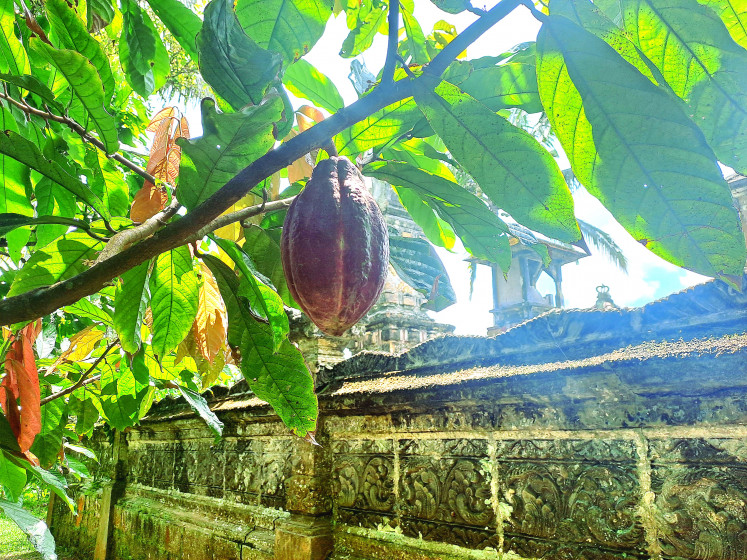Popular Reads
Top Results
Can't find what you're looking for?
View all search resultsPopular Reads
Top Results
Can't find what you're looking for?
View all search resultsIndonesian losses at WTO fuel concerns
The recent string of losses suffered by Indonesia at the World Trade Organization’s dispute panels have led to calls for better trade regulations that do not contradict the institution’s principles but at the same time continue to protect local industry
Change text size
Gift Premium Articles
to Anyone
T
he recent string of losses suffered by Indonesia at the World Trade Organization’s dispute panels have led to calls for better trade regulations that do not contradict the institution’s principles but at the same time continue to protect local industry.
Indonesia lost several cases in a row this year, including on paper with the United States, on agricultural produce and poultry with the US and New Zealand, on chicken with Brazil and on fatty alcohols with the European Union.
The losses have been blamed on weak trade regulations and a lack of experts capable of defending Indonesia’s interests before the panel of adjudicators at the trade governing institution.
Several restrictions that were put in place to protect local industries, such as limiting the number of seaports as import gateways, import quota provisions, seasonal bans and quantitative restrictions, have made Indonesia liable to litigation.
“Those restrictions contradict WTO principles in general, but we can still use many of its guidelines to continue to protect local producers, consumers, the environment and product quality guarantees,” international trade expert Poppy S Winanti from Gadjah Mada University said recently.
She said Indonesia’s trade policies had long contradicted WTO guidelines, while the body had improved its monitoring to detect such foul play, forcing Indonesia to be more aware of any policies that were against WTO principles.
The Trade Ministry, however, will not give in without a fight.
Foreign Trade Director General Oke Nurwan said the government would appeal the cases on paper and fatty alcohols because of some baseless allegations.
As for the agricultural produce, poultry and chicken cases, Indonesia has decided not to appeal and will thus only amend import regulations on food for the US, New Zealand and Brazil. This means the three countries can sell the goods freely in Indonesia and compete directly with local producers.
“We’ll obviously appeal [the paper and fatty alcohol cases], because some of the allegations are baseless. In the paper case, for example, [we question the allegation] that funding through the LPEI [Indonesian Export Financing Agency] is a subsidy,” Oke told The Jakarta Post.
The latest WTO panel report on Dec. 6 on the paper case read that the “[Government of Indonesia] had failed to provide the necessary information within a reasonable period of time and failed to act to the best of its ability in cooperating with the investigation.”
The US had imposed a 20.13 percent antidumping tariff and a 17.94 percent countervailing tariff on Indonesia’s coated paper, which is normally used for high-quality print graphics. In September, the WTO announced Indonesia had lost its appeal on the fatty alcohol antidumping measure imposed by the EU. The institution upheld a ruling from December 2016, declaring the EU had been within its rights to impose the duties and rejected most of Indonesia’s complaints.
Fatty alcohols are made from kernel oil, a palm oil derivative, and are mostly used in the production of detergents and surfactants, cosmetics, food and industrial solvents.
Regarding the loss on food imports to New Zealand and the US, Oke said the government was revising some regulations according to the global trade body.
“In regard to the food cases, we cannot appeal anymore, so we’ve been revising some regulations, including those related to seasonal bans,” he said.
The US and New Zealand filed a dispute because of a wide array of import measures applied since 2012 for some horticultural, animal and animal products, including restrictions on import gateways, periodic and fixed import terms and reference prices for certain food commodities.
Aside from strengthening legal regulations, the government also needs to improve its trade defense system by increasing the quality and quantity of its delegates at the Indonesian Permanent Mission in Geneva, Switzerland.
“The losses are predictable given that we don’t have enough representatives in Geneva,” University of Indonesia international law expert Mahmud Syaltout said.
He said Singapore had 20 representatives dealing only with the WTO, while Indonesia had fewer than 10 experts dealing not only with the WTO, but also with other bodies related to the United Nations. “However, our delegates there have suffered significantly from the higher cost of living and lower remuneration [compared to Singapore’s delegates], so it would be better to change this reward structure.”










